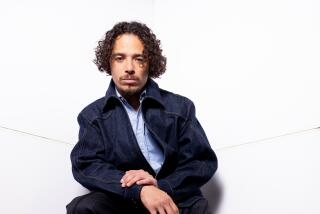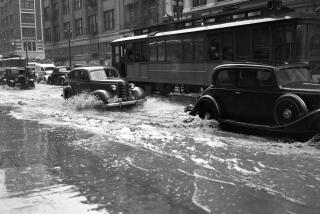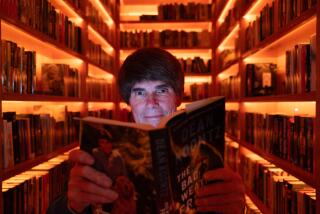Sunnier skies for ‘Weather Man’ screenwriter
- Share via
FOR screenwriter Steven Conrad, the story began when he witnessed a friend chuck a milkshake at their local Florida weatherman, Al Sunshine. It started Conrad thinking about why weathermen, often local celebrities, inspire a backlash against their bogus television nicknames and are held responsible for every bad weather forecast.
“I wondered what it was about weathermen that made people want to [throw things],” Conrad said. “Would they do it to Ted Koppel? Probably not. I think people have violent reactions when they think people are being fake to you.”
The experience helped inspire Conrad to write the screenplay for “The Weather Man,” which opens Friday in Los Angeles starring Nicolas Cage as Chicago weatherman David Spritz (shortened from Spritzel to make for a more refreshing weatherman name).
Although Spritz faces the occasional McDonald’s hot apple pie spiraling from a car window or Mexican food projectile, his main struggle is accepting his divorce and reining in his troubled children. He spends nights working on a cheesy spy novel he hopes will become the next bestseller and gain the respect of his high-achieving father, a Pulitzer Prize-winning author played by Michael Caine.
The film is based heavily on Conrad’s personal experiences, and when director Gore Verbinski needed tacky lines for David’s novel in the film, Conrad looked no further than his own young efforts at writing a CIA spy novel, which he still keeps around for laughs. Even further, both Conrad and Verbinski found they recognized David’s intelligent and hard-to-please father.
“My dad was really sharp and it’s true of Gore too -- his father was literally a nuclear physicist,” Conrad said. “My dad just happened to be one of these people who sees the world really deeply, sees everyone’s weaknesses and sees when people are being dishonest about themselves.”
For the role of Robert, Verbinski wanted an actor who would reflect the father’s perfect order and superiority to the chaotic existence of his son.
“His father is filet mignon and he’s an Egg McMuffin,” Verbinski said of David’s character. “I kind of feel like the film deals with this entire struggle against mediocrity. There are great people and then there is the rest of us. When do we stop imagining who we could be and start imagining who we are.”
For David Spritz, his attempts to seek fulfillment in his job are thwarted at every turn.
“It’s wind, man, it blows all over the place,” says an exasperated meteorologist when David tries to make sense of his job.
Cage saw this role as a prime opportunity to play a character in a family drama that wasn’t tacky or saccharine.
“I didn’t want it to be a movie that seems like it could be made for TV -- this movie is a reflection to an epidemic of divorce in our country, and I’m no stranger to that club,” Cage said of his two divorces. “I wanted to kind of express all those feelings that I’ve built up over the years, and instead of lying around and moping I wanted to do something good with all the emotion.”
For Conrad, “The Weather Man” was a triumph after more than eight years of struggling in the business.
At the age of 21 and just barely out of college, Conrad sold his first screenplay, “Wrestling Ernest Hemingway,” to producer Todd Black. The 1993 film starred Robert Duvall and Shirley MacLaine, but Conrad said it would take him several more years to hit his stride as a writer.
“I was a kid and still learning how to write,” he said. “After a couple of scripts that weren’t getting any interest, I couldn’t get anyone on the phone anymore. Once I decided this was what I was going to be at age 27, I became an obsessive movie watcher and found myself getting lost in them. It was really tight for a stretch, but I was able to continue making a living.”
Conrad, now 36, also sold “The Weather Man” to Black. Conrad was pleased that the movie, which he set in Chicago, was filmed there in its entirety, thanks to Verbinski’s insistence.
“There was a lot of pressure to move to Canada to take a tax break and it’s cheap,” Verbinski said. “But the weather is a character, and Chicago is a character. So we made a lot of budget cuts in a lot of places, but it was worth it.”
Conrad is teamed up with Black again on two upcoming films, “The Pursuit of Happyness,” a drama that stars Will Smith as a down-on-his-luck salesman who takes custody of his son, and “Chad Schmidt,” a comedy about a Brad Pitt look-alike struggling to make it in Hollywood. (Pitt will play himself and his mirror image.)
Black said he has always admired Conrad’s straightforward and emotionally honest writing and that “The Weather Man” defies the stereotype of what might be expected from a big studio film.
“Steve writes warts and all,” Black said. “No one had read a screenplay like it before. He says things that men in general I think feel but don’t know how to say or are afraid to say.”
Although there are spurts of physical humor and clever quips, Conrad said his script is driven by the sometimes desperate search to find pride in the midst of personal crisis.
“I have people in my life who are falling to pieces in one way or another -- guys who are cheating on their wives or not paying attention to these kids,” he said. “The only way we talk about pride now is if you’re proud of your country, but my hope for all of us is that we find pride that leads to confidence that leads to happiness that leads to contentment.”
*
Times staff writer Susan King contributed to this report.
More to Read
Only good movies
Get the Indie Focus newsletter, Mark Olsen's weekly guide to the world of cinema.
You may occasionally receive promotional content from the Los Angeles Times.










